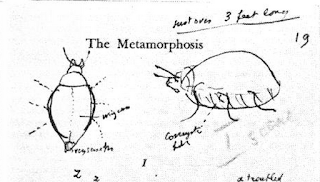Nikon Small World Photomicrography Competition (2017)
I.
The above image by Teresa Zgoda, revealing the anterior end of a pork tapeworm, is truly the stuff of nightmares. No wonder then that after coming across it, a friend of mine experienced a metamorphic dream in which he had the head and short neck of the creature atop his still human body.
As he described what had happened to him in his dream, it became clear that there was no point my telling him not to worry, as, clearly, he was profoundly disturbed by this - and perhaps rightly so; for if transforming into a macroparasite isn't troubling, then what is?
Besides, don't worry is such a crass response; insensitive and inadequate; dismissive and minimising. When people are upset, they want to be able to express their worries and fears and they want, perhaps, to be offered some explanation for why they are feeling as they do.
They certainly don't want to hear the words don't worry, never mind, or calm down. Nor do they want to be told to get over it, as if their emotional distress were something trivial and slightly embarrassing (something they either have to justify or apologise for).
II.
Having said that, what do you say to a man who is worried about becoming-tapeworm? Who has seen himself (in his dreams) with that terrifying attachment organ, the scolex, where his head should be and fears his body is becoming whiter and flatter and more ribbon-like by the day?
I'm not a psychiatrist, or dream therapist, and I'm afraid my only experience in these matters is as a reader of fiction ...
One thinks of Gregor Samsa, for example, who famously wakes up one morning to find himself inexplicably transformed into a large insect (commonly depicted as a cockroach). Initially assuming this to be a temporary change and that he will soon be back to normal, Gregor is, at first, philosophical about what has happened to him. Unfortunately, however, he doesn't recover his human form and things end tragically for him [1].
One also thinks of Marda West, in Daphne du Maurier's extraordinary short story 'The Blue Lenses' (1959), in which everyone appears to suddenly lose their human features and is seen with the head of the creature that best expresses their inhuman qualities; not so much their true nature, as what might be termed their molecular animality. Again, this might sound amusing at first, but any comic aspects quickly give way to horror [2].
I would advise my friend, therefore, to take his dream seriously. But I would also remind him that our humanity is nothing originary and autonomous; in fact, there are no free-living organisms - we are all parasites living off the lives of others ...
Notes
[1] I'm referring, of course, to Franz Kafka's novella, Die Verwandlung (1915). There are many English editions of this text available, but I would recommend the translation by Susan Bernofsky, that comes with an introduction by David Cronenberg; The Metamorphosis (W. W. Norton and Co., 2014).
For my analysis of the case of Gregor Samsa, see the first of my becoming-insect posts: click here.
[2] See
Daphne du Maurier, 'The Blue Lenses', in The Breaking Point, (Virago Press, 2009), pp. 44-82. For my reading of this tale, click here.
This post is for my friend Síomón Solomon.



